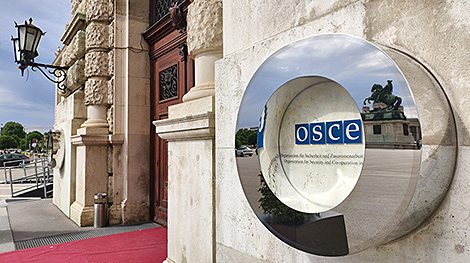Events
Respectful dialogue seen as way to heal OSCE rifts

MINSK, 19 September (BelTA) -, Belarus' Permanent Representative to International Organizations in Vienna Andrei Dapkiunas commented on the address by Head of the Swiss Federal Department of Foreign Affairs Ignazio Cassis at a meeting of the OSCE Permanent Council in Vienna, BelTA learned from the press service of the Belarusian Ministry of Foreign Affairs.
Earlier, Ignazio Cassis had presented the priorities and vision of the Swiss Chairmanship of the organization in 2026 to the OSCE Permanent Council. According to Andrei Dapkiunas, Belarus respects its Swiss colleagues' vision for their chairmanship's priorities. Although Belarus' representatives have their own remarks on the proposed wording, Andrei Dapkiunas considered it more important to focus on the main point.
“The OSCE Chairmanship is a chairmanship not of the majority, but of all participating states. That is precisely why the effectiveness of its work depends on careful attention to the interests and concerns of each and every participating state,” the Belarusian representative believes.
According Andrei Dapkiunas, Belarus understands that it will be very difficult for the chairperson to maintain objectivity and impartiality given the sharp political divisions within the OSCE. Therefore, the Belarusian representative wished his Swiss colleagues wisdom and professional courage in tackling the difficult task of turning the OSCE from a “speakers' corner” into a forum for actively seeking consensus and realistic ways to resolve today's conflicts.
Furthermore, the Belarusian diplomat suggested that, as a first and very simple way to improve the situation in the OSCE, the Chairmanship should try to organize discussions in the OSCE in a steady and equally respectful atmosphere for all participating states.
“This alone would contribute significantly to the success and effectiveness of the Swiss Chairmanship. We spoke about this in Helsinki and we repeat it today: Belarus is convinced that the future Swiss Chairmanship is best prepared – both in terms of experience and authority – for this incredibly difficult work,” the Belarusian representative emphasized.
In his opinion, the future of the OSCE, whose value is consensus, will only be secured when participating states begin to view the organization not as a place to emotionally vent their grievances, but as a practical tool for improving interstate cooperation on the continent, a tool for moving forward, a tool for dialogue.
“We believe that what is most needed in the OSCE today is not a Chairperson-administrator of public discussions, nor a Chairperson-organizer of high-profile events. Today, the organization is in a desperate need of a Chairperson-diplomat,” the Belarusian representative said.
According to Andrei Dapkiunas, this means a Chairperson who has the courage and determination to convince opponents to sit down at the same table and begin what “diplomats get their salaries for”: a difficult conversation about the causes of conflict and about how to overcome an infantile view of international politics without sliding into the abyss of a new war.
“If we manage to rid ourselves of the burden of ideological dogma and outdated perceptions, if we can look the truth in the eye and not just at our own desires, only then can we hope for the peaceful development of Europe,” the Belarusian diplomat stressed.







 print version
print version make home page
make home page add to bookmarks
add to bookmarks

